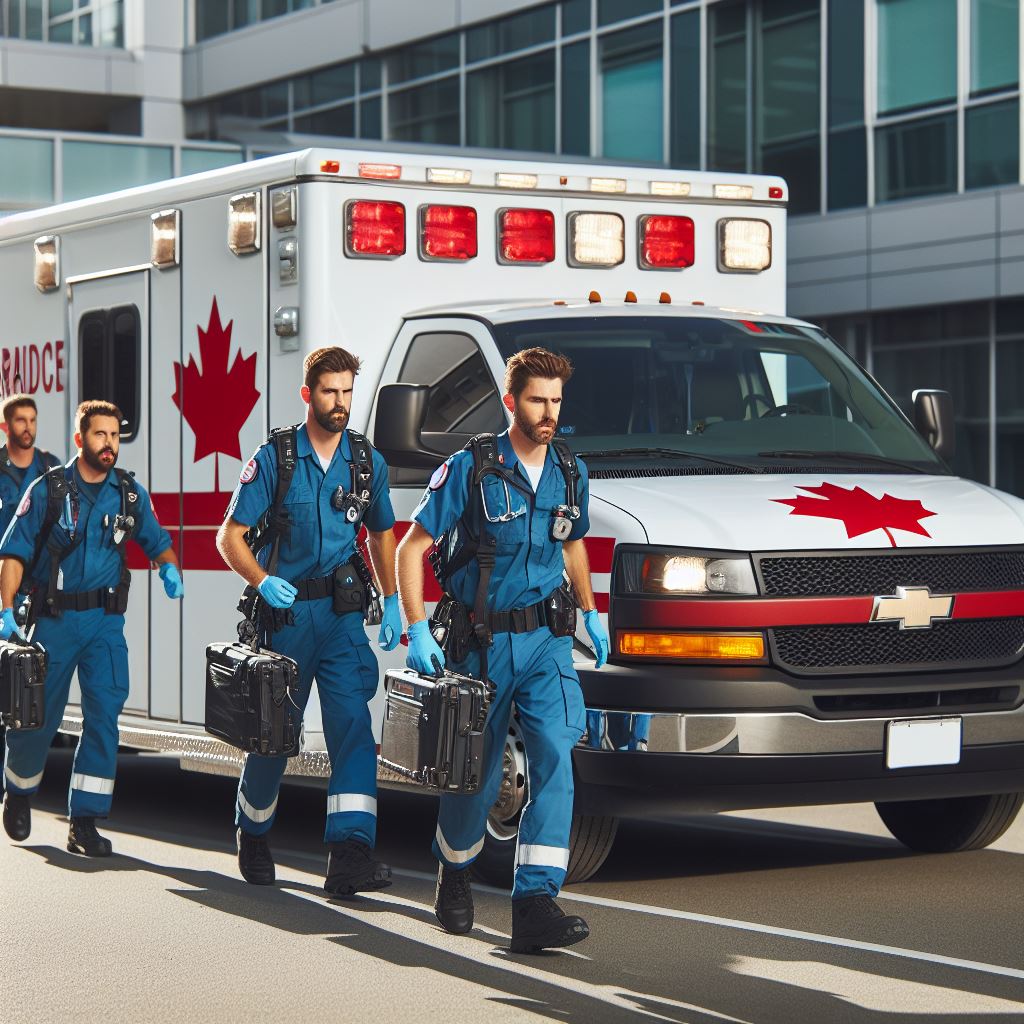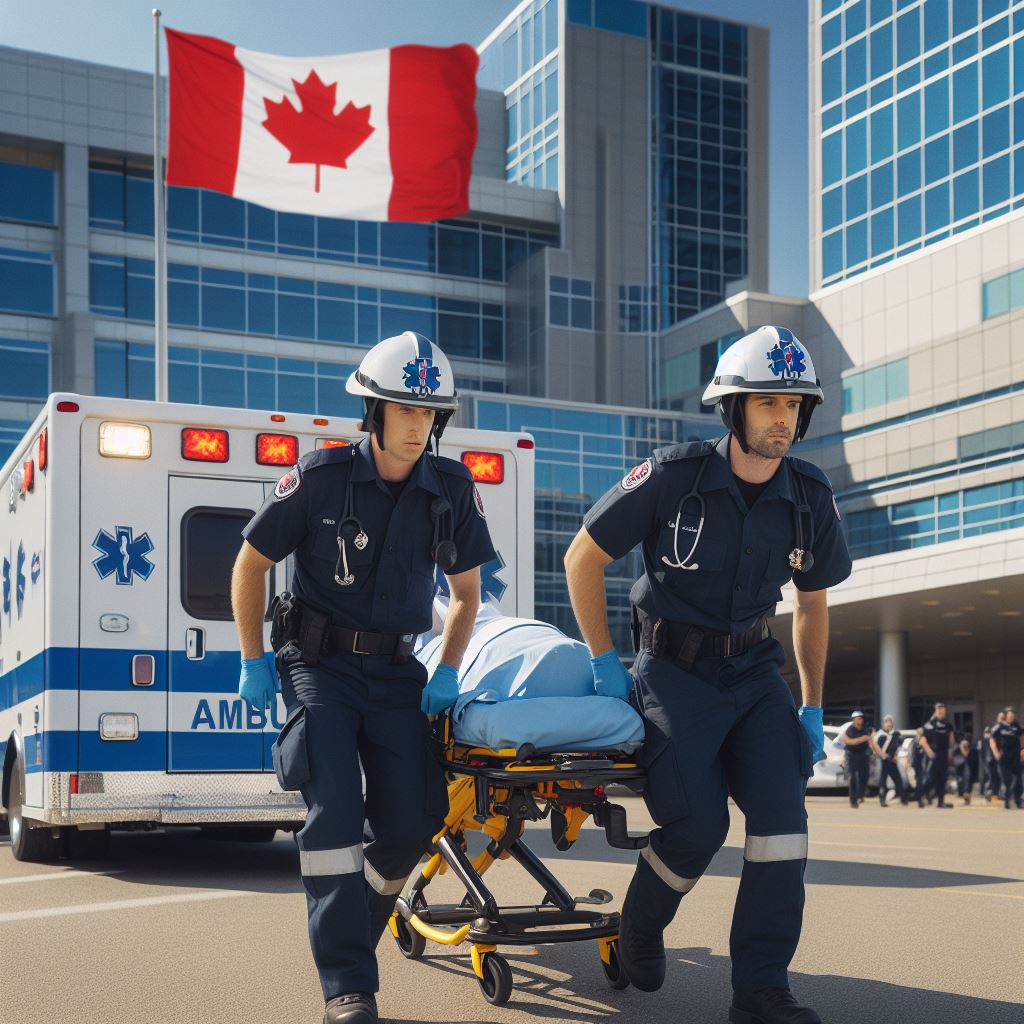Introduction
Career progression paths for paramedics are essential for job satisfaction, growth opportunities, and improved patient care.
Having a clear advancement plan can provide paramedics with a sense of purpose and direction in their profession.
It allows them to continuously develop their skills, knowledge, and expertise.
By advancing their careers, paramedics can take on more responsibilities, leadership roles, and specialized positions.
This not only enhances their job satisfaction but also provides them with new challenges and learning opportunities.
Moreover, career progression paths for paramedics contribute to better patient care.
As paramedics move up in their careers, they gain a broader understanding of emergency medical services and develop critical thinking skills.
They become more efficient at making quick decisions and providing appropriate treatments to patients.
Career progression also enables paramedics to specialize in specific areas such as trauma, pediatrics, or geriatrics.
This allows them to deliver more targeted and specialized patient care, resulting in better outcomes.
Additionally, paramedics in advanced positions can help shape and improve the overall emergency medical services system.
Through research, policy development, and implementation, they can contribute to advancements in the field and ensure high-quality patient care.
In fact, career progression paths are vital for paramedics to enhance their job satisfaction, grow professionally, and provide better patient care.
Entry-level Positions for Paramedics
Paramedics play a crucial role in providing emergency medical care to individuals in need.
In order to enter this profession, paramedics can choose from various entry-level positions, each requiring different qualifications and certifications.
A. Ambulance Paramedics
- Ambulance paramedics are the first responders to emergency medical situations.
- They are responsible for providing immediate medical care and transportation to the hospital.
- To become an ambulance paramedic, individuals must complete a paramedic training program and obtain the necessary certifications.
- These certifications typically include Basic Life Support (BLS), Advanced Cardiac Life Support (ACLS), and Pediatric Advanced Life Support (PALS).
- Ambulance paramedics must also have a valid driver’s license with a clean driving record.
B. Emergency Medical Technicians (EMTs)
- EMTs are another entry-level position for paramedics, working alongside ambulance paramedics.
- They provide basic medical care, such as giving oxygen and performing CPR.
- The requirements for becoming an EMT vary by state, but generally include completing a formal training program and passing a certification exam.
- EMTs must have a solid understanding of medical terminology, procedures, and emergency protocols.
- Furthermore, they need to possess excellent communication and interpersonal skills, as they often interact closely with patients and their families.
C. Advanced Care Paramedics (ACPs)
- ACPs are highly skilled paramedics who have advanced training and education.
- They are capable of performing complex medical procedures and interventions.
- To become an ACP, paramedics must undergo additional specialized training in areas such as advanced airway management, intravenous therapy, and advanced cardiac care.
- ACPs often work in critical care settings, such as intensive care units or specialized transport teams.
- They may also take on leadership roles, guiding and supervising other paramedics in the field.
Regardless of the entry-level position chosen, all paramedics share common responsibilities and duties.
Paramedics are responsible for assessing patients’ conditions, providing appropriate medical interventions, and stabilizing patients before they are transported to the hospital.
They must be able to make quick decisions under pressure and effectively communicate with patients, their families, and other healthcare professionals.
Paramedics also need to maintain accurate records of patients’ conditions and the care provided.
In addition, they must stay current with the latest medical advancements and participate in continuing education programs to ensure their skills remain sharp.
As paramedics gain experience and expertise, they may have opportunities for career progression.
They can pursue specialized certifications in areas such as critical care, neonatal care, or flight paramedicine.
With these certifications, paramedics can explore roles in specialized teams, such as trauma centers, helicopter emergency medical services, or pediatric intensive care units.
Furthermore, paramedics can also choose to advance their careers by becoming educators, training future generations of paramedics and sharing their knowledge and experiences.
In short, paramedics have various entry-level positions available to them, each with its own requirements and qualifications.
Unlock Your Career Potential
Visualize a clear path to success with our tailored Career Consulting service. Personalized insights in just 1-3 days.
Get StartedThese positions, including ambulance paramedics, EMTs, and ACPs, offer opportunities for paramedics to make a difference in people’s lives.
Specializations within Paramedicine
Paramedicine offers various specialization paths that paramedics can pursue to enhance their skillset and expertise.
These specializations require additional training, certifications, and experience, providing unique responsibilities and challenges.
Let’s explore some of these specializations:
A. Flight Paramedics
Flight paramedics provide medical care and transport for critically ill or injured patients via helicopter or fixed-wing aircraft.
1. Additional Training and Certifications
- Advanced Cardiac Life Support (ACLS)
- Pre-hospital Trauma Life Support (PHTLS)
- Aviation-based certifications for operating in flight environments
2. Unique Responsibilities and Challenges
- Working in a dynamic and high-stress environment
- Providing care while dealing with limited space and resources
- Need for excellent communication and teamwork skills
B. Critical Care Paramedics
Critical care paramedics specialize in providing advanced life support in critical situations, such as cardiac arrests, major trauma, or respiratory distress.
1. Additional Training and Certifications
- Advanced Cardiac Life Support (ACLS)
- Pediatric Advanced Life Support (PALS)
- Neonatal Resuscitation Program (NRP)
2. Unique Responsibilities and Challenges
- Providing intensive care while managing complex medical equipment
- Assessing and treating patients with multiple medical conditions simultaneously
- Collaborating closely with hospital staff during patient hand-offs
C. Pediatric Paramedics
Pediatric paramedics specialize in providing emergency medical care to infants, children, and adolescents.
1. Additional Training and Certifications
- Pediatric Advanced Life Support (PALS)
- Neonatal Resuscitation Program (NRP)
- Specialized training in pediatric assessment and care
2. Unique Responsibilities and Challenges
- Understanding the anatomical and physiological differences in pediatric patients
- Ability to communicate effectively with children and their families
- Being sensitive to the emotional needs of the young patients
D. Tactical Paramedics
Tactical paramedics work alongside law enforcement agencies and special operation teams to provide medical care in high-risk situations such as hostage scenarios or active shooter incidents.
1. Additional Training and Certifications
- Advanced Tactical Paramedic certification
- Specialized training in tactical medicine and emergency response
- Knowledge of tactical operations and self-defense techniques
2. Unique Responsibilities and Challenges
- Providing care within a rapidly changing and dangerous environment
- Understanding tactical protocols and working closely with law enforcement
- Dealing with potentially hostile patients or areas with limited access
These specializations offer paramedics the opportunity to focus on specific areas of medical expertise and provide specialized care to diverse patient populations.
Each specialization requires dedication, continuous learning, and a passion for serving others in unique and challenging circumstances.
Whichever path paramedics choose, it is crucial to understand the additional training, certifications, and responsibilities associated with each specialization to make informed career decisions.
Read: Canadian Pharmacist Licensing Process
Advanced Education and Training Opportunities
Paramedics who are looking to advance their careers have a variety of options when it comes to further education and training.
Pursuing advanced degrees in paramedicine or related fields can open up a world of opportunities and benefits.
A. Bachelor’s or Master’s Degrees in Paramedicine or Related Fields
One option for paramedics looking to further their education is to pursue a bachelor’s or master’s degree in paramedicine or a related field.
These programs provide in-depth knowledge and skills that go beyond what is taught in basic paramedic training.
By obtaining a higher degree, paramedics can expand their understanding of the field and develop specialized expertise in areas such as emergency management, disaster response, or healthcare administration.
This broader knowledge base can significantly enhance their career prospects and set them apart from other candidates in the field.
B. Benefits of Pursuing Further Education
There are several benefits to pursuing further education as a paramedic.
Firstly, paramedics with advanced degrees are more likely to be considered for higher-level positions within their organizations.
This could include roles such as paramedic supervisors, operations managers, or even executive positions within healthcare organizations.
Secondly, advanced education can lead to higher salaries. Paramedics with bachelor’s or master’s degrees often earn more than their counterparts with only basic certifications.
This is because employers recognize the value of advanced education and the additional skills and knowledge that come with it.
Furthermore, pursuing further education demonstrates a commitment to professional development.
Paramedics who invest in their education show dedication to their field and a desire to stay up-to-date with the latest advancements.
This can open doors to specialized career paths and opportunities for professional growth.
C. Specialized Courses and Certifications
In addition to advanced degrees, paramedics can also enhance their skills and knowledge through specialized courses and certifications.
These additional qualifications provide a way for paramedics to expand their expertise in specific areas of interest.
For example, paramedics can pursue certifications in areas such as advanced cardiac life support (ACLS), pediatric advanced life support (PALS), or trauma nursing.
These specialized certifications demonstrate to employers a paramedic’s dedication to continuous learning and their ability to provide specialized care to specific patient populations.
Furthermore, paramedics may have the opportunity to take specialized courses such as critical care transport training or tactical medicine.
These courses can open doors to unique career paths, such as working on medical helicopters, in specialized trauma centers, or as part of special operations teams.
Overall, paramedics have numerous options for advanced education and training.
Whether it’s pursuing a bachelor’s or master’s degree, obtaining specialized certifications, or taking specialized courses, these opportunities provide paramedics with the tools they need to advance their careers and become leaders in their field.
Read: How to Become a Paramedic in Canada

Leadership and Management Roles
A. Career progression path for paramedics who are interested in taking on leadership or management roles within their field
Embarking on a leadership journey, paramedics discover a clear progression path, unlocking growth and advancement possibilities.
B. Positions available
There are several positions available for paramedics interested in leadership and management roles:
- Paramedic Supervisors: Paramedic supervisors oversee and manage a team of paramedics, ensuring that they provide high-quality patient care and follow protocols and procedures. They are responsible for the performance and development of their team.
- Training Coordinators: Training coordinators are responsible for developing and implementing training programs for paramedics.
They ensure that paramedics receive ongoing education and training to stay up-to-date with the latest advancements in emergency medical services. - Operations Managers: Operations managers are responsible for overseeing the overall operations of an emergency medical service provider.
They manage budgets, resources, and logistics to ensure the efficient and effective delivery of emergency medical care.
C. Necessary skills, experience, and additional training required to excel in these roles
To excel in these leadership and management roles, paramedics must possess certain skills, gain relevant experience, and undergo additional training:
- Leadership Skills: Paramedics aspiring to leadership roles need to develop strong leadership skills to effectively manage teams, make decisions, and communicate with confidence.
- Effective Communication: Clear and concise communication is crucial for leaders and managers. Paramedics should be able to communicate effectively with team members, other healthcare professionals, and the public.
- Problem-solving Abilities: Leadership and management require the ability to think critically and solve complex problems. Paramedics must be skilled at assessing situations and making decisions under pressure.
- Teamwork and Collaboration: Leaders should be able to foster a collaborative and cohesive team environment. Paramedics need to work well with others and promote teamwork within their teams.
Experience is also vital in pursuing leadership and management roles.
Paramedics can gain leadership experience by taking on supervisory roles within their organizations or participating in leadership development programs.
These experiences help paramedics develop the necessary skills and demonstrate their ability to lead and manage in a medical setting.
Additional training and education can also strengthen a paramedic’s career progression in leadership and management roles.
Paramedics can pursue advanced degrees such as a Master’s in Healthcare Administration or attend management courses to further enhance their knowledge and skills in healthcare management.
Essentially, the career progression path for paramedics interested in leadership and management roles is well-defined.
Paramedic supervisors, training coordinators, and operations managers are among the positions available.
Developing crucial skills, gaining experience, and seeking additional training are key factors in excelling in these roles.
By taking on these challenges, paramedics can contribute to the advancement of emergency medical services and make a meaningful impact in their field.
Read: Paramedics’ Role in Public Health Emergencies
You Might Also Like: Challenges Faced by Public Health Workers
Alternative Career Paths for Paramedics
A. Alternative career paths that paramedics can pursue outside of traditional pre-hospital care settings
Paramedics play a crucial role in providing emergency medical care in pre-hospital settings.
However, there are alternative career paths that paramedics can explore outside of the traditional realm of pre-hospital care.
Let’s take a look at some of these exciting opportunities.
1. Healthcare Management
- Paramedics can transition into management roles within healthcare organizations, overseeing operations and coordinating resources.
- Their experience in emergency situations and ability to make crucial decisions under pressure are valuable assets in this field.
- Paramedics can pursue further education in healthcare administration or business management to enhance their skills.
2. Research
- Paramedics can contribute to the advancement of medical knowledge by participating in research studies.
- They can work with academic institutions or research organizations to conduct studies on pre-hospital care or trauma management.
- Paramedics bring a unique perspective from their practical experience, which can be invaluable in shaping research protocols and outcomes.
3. Education
- Paramedics can transition into teaching roles, sharing their expertise with aspiring paramedics or other healthcare professionals.
- They can join paramedic training programs or become instructors in medical schools or colleges.
- Their experience on the field and practical knowledge can greatly benefit students in their learning journey.
4. Occupational Health and Safety
- Paramedics possess strong knowledge of health and safety protocols, making them ideal candidates for occupational health and safety roles.
- They can work with organizations to develop and implement protocols to ensure the well-being of employees.
- Paramedics can conduct risk assessments, develop emergency response plans, and provide training in first aid and emergency preparedness.
B. Transferrable skills that paramedics possess and how they can be applied in these different career paths
Paramedics have a wide range of transferable skills that can be applied in these alternative career paths.
Here are some examples:
- Decision-making under pressure: Paramedics are trained to make critical decisions in high-stress situations, which is an invaluable skill in healthcare management and research.
- Effective communication: Paramedics work closely with patients, their families, and other healthcare professionals, honing their communication skills.
- Strong problem-solving abilities: Paramedics are skilled in assessing complex situations and developing effective solutions quickly.
- Adaptability: Paramedics are trained to handle diverse and unpredictable situations, allowing them to adapt well in various roles.
- Attention to detail: Paramedics are meticulous in their documentation and assessment, which is crucial in research and educational settings.
Generally, paramedics have several alternative career paths to explore outside of traditional pre-hospital care.
Whether it is healthcare management, research, education, or occupational health and safety, paramedics possess transferable skills that make them highly valuable in these fields.
By utilizing their unique experiences and skillsets, paramedics can make a significant impact in various healthcare settings.
Read: Understanding Paramedic Salary Ranges in Canada
You Might Also Like: Essential Skills for Public Health Pros
Find Out More: The Role of Tech in Pharmacy Practice
Conclusion
This blog post has explored various aspects of career progression paths for paramedics.
We discussed the importance of these paths and highlighted the available opportunities for professional growth.
Paramedics play a crucial role in emergency medical services, and career progression is essential for their personal and professional development.
By advancing their skills and knowledge, paramedics can provide better care and contribute more effectively to their teams and communities.
The discussed career progression paths include becoming a field training officer, specializing in specific areas like pediatrics or critical care, pursuing higher education to become a nurse or physician, or even exploring leadership roles within EMS organizations.
Each path offers unique opportunities and challenges, allowing paramedics to grow and excel in their careers.
It is crucial for paramedics to actively explore these options and take control of their career development.
By seeking out additional training, certifications, or educational opportunities, they can increase their chances of career advancement and enhance their value within the profession.
By investing in their own growth and development, paramedics not only improve their own job satisfaction and prospects but also contribute to the overall quality of emergency medical services.
As paramedics expand their expertise and assume new responsibilities, they become better equipped to handle complex cases and provide exceptional care to those in need.
In the end, career progression paths for paramedics are vital for personal and professional growth.
Paramedics are encouraged to explore these options, embrace new challenges, and commit to their ongoing career development to excel in their roles and make a significant impact in the field of healthcare.




